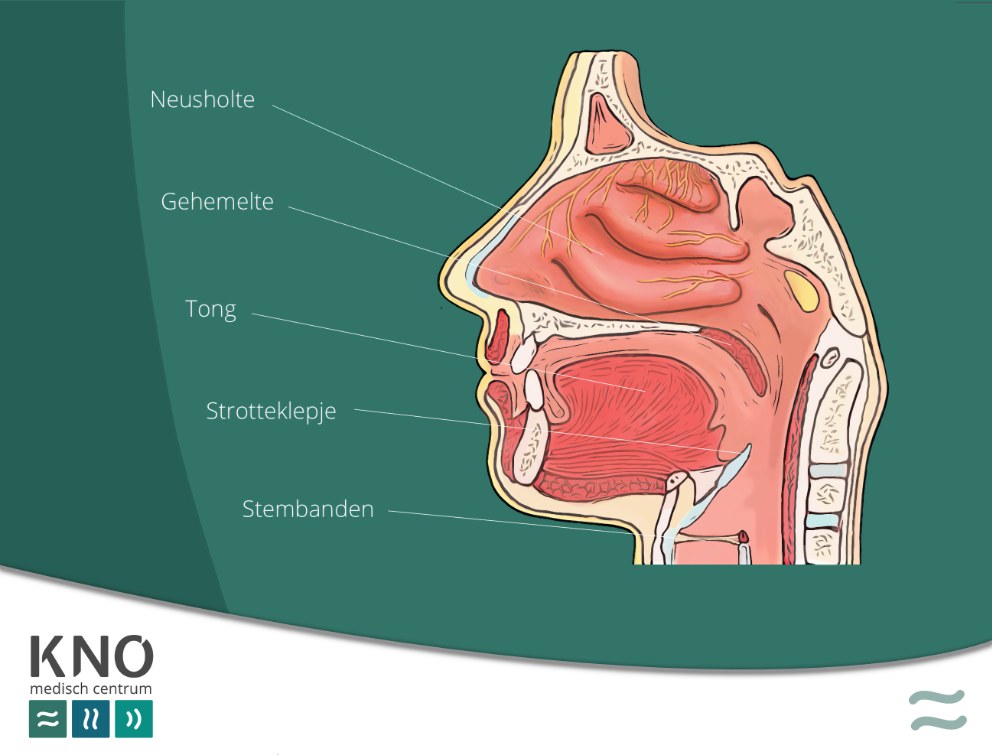what is mucus in the throat?
explanation
In the entire throat and nose area there are mucous cells that make mucus. This moistens the throat and makes it easy for us to swallow and talk. If too much mucus accumulates in the throat, this can cause complaints. A feeling of excessive mucus in the throat is very common. Often this feeling is at the level of the larynx, where someone may also have the tendency to swallow or scrape more often. There may also be complaints of a lump feeling in the throat. Often no clear cause is found, the complaints are harmless and often disappear on their own. Nevertheless, long-term complaints can lead to anxiety.

what causes mucus in the throat?
cause
Excessive mucus can have several causes:
thickening of the mucus due to dehydration
If mucus is produced to a sufficient extent by the mucous cells in the throat, this will not cause any complaints. However, due to dehydration, mucus can become a bit thicker in composition and cause complaints in the throat. The most common causes of dryness of the throat are:
Breathing too much through the mouth
If someone breathes too much through the mouth, the mucous membranes dry out, causing a dry throat and often also a feeling of mucus accumulation.
Snoring
During snoring the mucous membrane in the throat flaps, creating vortices of air. These vortices can dry out the throat mucosa, creating the sensation of a dry throat.
Overload
When we swallow, talk and scrape, certain throat and neck muscles are tightened. The vocal cords are also controlled by muscles. Incorrect use of the voice can overload the neck muscles, causing a feeling of dryness in the throat. If you are less tense, the complaints often become less.
What to do against mucus in the throat?
solution
Measures you can take yourself. It is possible to soothe a dry throat yourself:
- Drink regularly
- Avoid alcohol, spicy food or carbonated drinks.
- Do not smoke.
- Sucking on a soda or licorice can relieve the symptoms of a dry throat.
- Take some rest and do not strain the voice too much.
Reassurance
Treatment is often not necessary. Often it is enough to reassure people that there are no serious causes for excessive mucus in the throat. After this, the complaint often gradually disappears by itself, with the complaint still playing up every now and then. It often disappears permanently after weeks to months.
Reducing tensions
Tensions and emotional problems can manifest with various physical complaints such as excessive mucus in the throat. Your GP can help to put your problems into words and can call in another care provider if necessary.
Which medicine helps for mucus in the throat?
medicine
Expectorants
Can make the slime a little less chewy. However, they don’t always work.
antacids
May have an effect if there is heartburn or belching.

What possible conditions can cause mucus in the throat?
disorders
Although rare, there can also be other causes for a lump feeling. Especially if, in addition to the lump feeling, other complaints also arise, such as difficulty with swallowing, sore throat, earache or hoarseness. You can think of the following disorders:
A malignant tumor (throat cancer)
Fortunately, a malignant disease of the mucous membrane of the throat, larynx or esophagus is rare. If someone smokes for a long time or uses alcohol excessively, the chance of this is greatly increased. The complaints are often accompanied by voice changes, difficulty eating, weight loss and ear pain. An examination by an ENT specialist is necessary if the symptoms do not disappear after 6 weeks. A malignant tumor can usually be detected through this examination.
Allergy
Allergy to house dust mites in particular, a component of house dust, usually leads to complaints of nasal congestion, but can also manifest itself in the throat, where it can cause excessive mucus or a sore, itchy or lumpy feeling.
Sinus infection
If, in addition to the mucus, there are also complaints such as headache, nasal mucus and congestion and loss of smell, there may be an inflammation of the paranasal sinuses. The inflamed mucus secretion can accumulate in the throat.
Disfunction of the vocal cords
Sometimes there is a problem with the construction of the vocal cords, so that they sometimes do not function properly. This makes it more difficult to speak with a strong voice. Hence the voice is easily overloaded. In addition to a hoarse voice or an insufficiently powerful voice, people sometimes also complain about excessive mucus in the throat.
Muscle tension of the esophagus muscle
At the transition from the throat to the esophagus, there is a sphincter muscle. In some patients the tension of this muscle is too high. This can cause a lump or mucus feeling. This complaint is often accompanied by swallowing problems. Eating is often difficult. Sometimes the cause can be a diaphragmatic rupture, in which the valve mechanism between esophagus and stomach does not work properly. This allows gastric acid to rise up into the esophagus. To prevent the overflow of gastric acid into the larynx and trachea, a higher tension is created in the sphincter muscle of the esophagus entrance, resulting in the lump feeling.
Heartburn
Excess mucus in the throat can also be caused by gastric acid. This can travel up the esophagus and cause an irritation in the throat, causing more mucus to build up in the throat. Your GP or ENT specialist can prescribe you a trial treatment with gastric acid inhibitors if necessary.
Enlarged thyroid
The thyroid gland lies directly in front of the larynx. An enlarged thyroid can sometimes press against the throat, causing a lump or mucus sensation. Often there are also additional complaints of a thyroid gland that works too slowly or too quickly.
Chronic throat infection (laryngitis)
If the mucous membrane in the throat is stimulated for a long time, a chronic throat infection can develop. Causes for this are:
- nasal and sinus problems
- gastric acid
- smoking or alcohol
- dry air.
The mucous membrane can also be chronically inflamed in certain diseases, such as diabetes and anemia. Complaints that may arise are: mucus in the throat, tickling in the throat, burning, a sensitive spot in the trachea, persistent cough, tendency to scrape and difficulty swallowing. Coffee, smoking and alcohol perpetuate these complaints.
Zenkers diverticulum
A weak spot can develop between the muscles of the esophagus at the entrance of the esophagus, which can cause a bulge. This can cause complaints of difficulty swallowing, giving up swallowed food, bubbling sounds in the neck, mucus in the throat, emaciation, bad breath, choking and coughing when lying down.
When to contact us?
contact
If the feeling of mucus in the throat does not disappear or if complaints worsen, make an appointment with an ENT specialist. Sometimes there can be a physical cause for your complaints. The ENT doctor can easily view the throat with a fibercopy: For more information, see: throat examination through the nose.
More information
Dutch Association for ENT Surgery
Lump in the throat
Voice problems in adults
Stomach liver gut foundation
Voice and swallowing center
Center for swallowing and passage complaints, extensive explanation about voice and swallowing problems.
This patient information has been compiled with the utmost care. It concerns general information. No rights can be derived from this information.
© KNO Medisch Centrum / knomc.addsoul.nl
